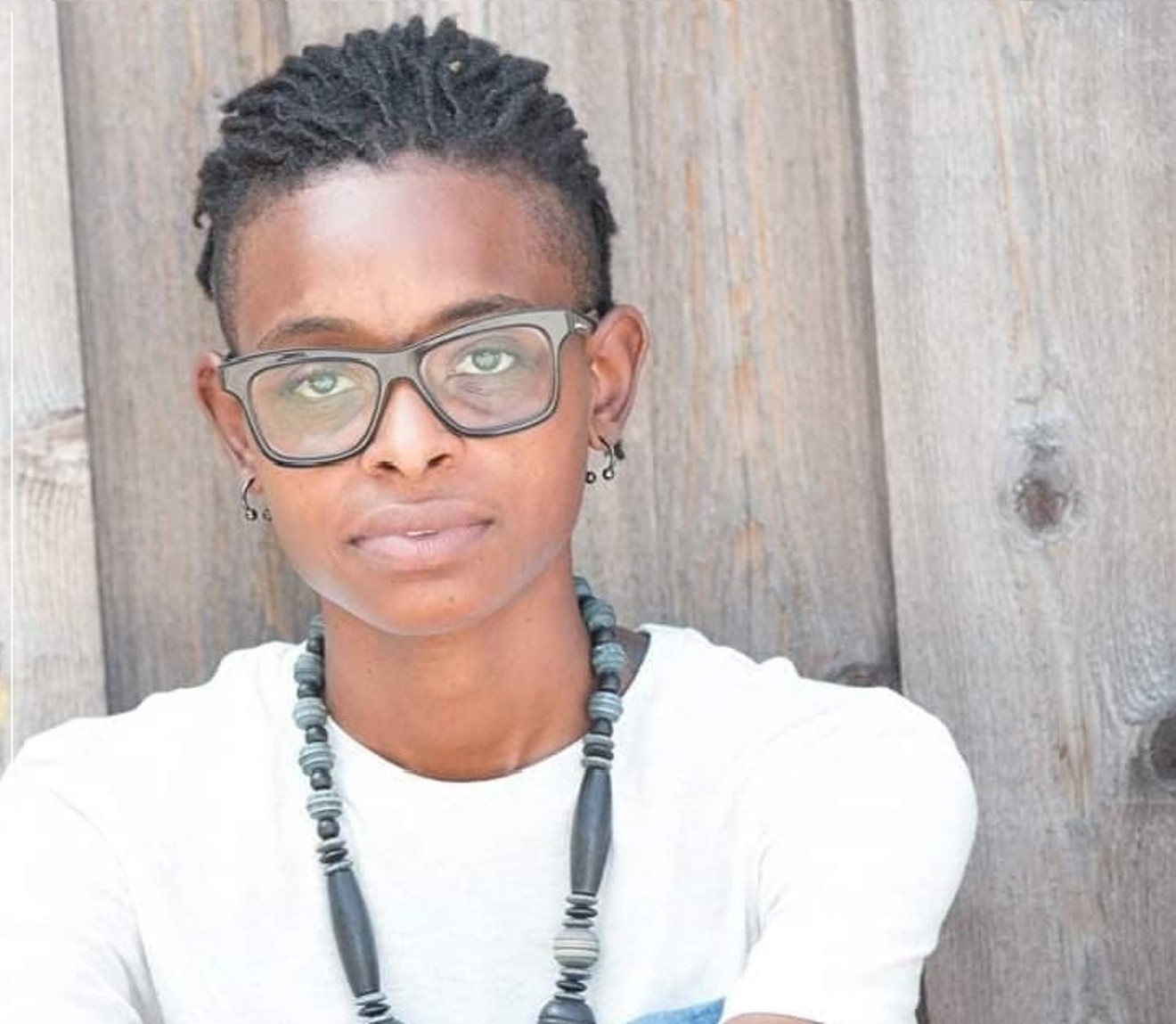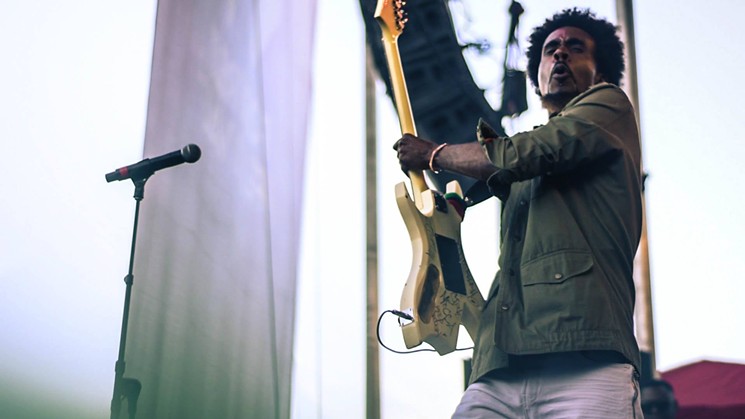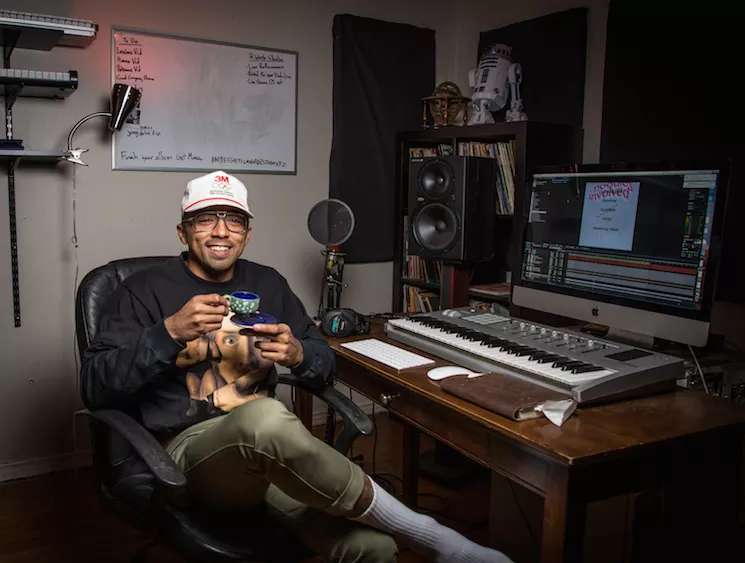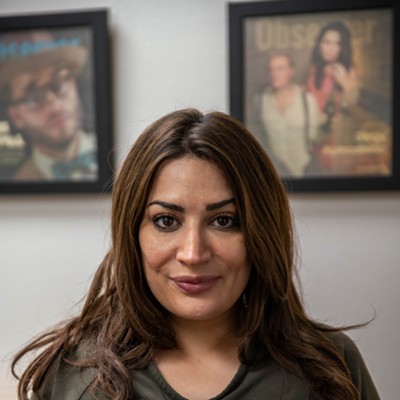They were 9 years old, the same number of police cars that showed up soon after someone called to report a group of black kids playing by the church. It was the 1980s in Inglewood, and the time when musician Stone Mecca says he learned he’d be treated differently in life on account of his race.
As an artist, Mecca has had a string of successes. He’s toured with the Wu-Tang Clan. He’s worked with hip-hop greats like Snoop Dogg, Ice Cube and Eazy-E. Just as memorable is the string of incidents with racial profiling that have followed Mecca no matter which part of the country he makes his home.
It all started that afternoon on the church’s steps. Mecca remembers the officers started grabbing the kids by their shirts and “yanking them around.” He was in a place out of view, where he didn’t think the cops could see him, and that worried him.
“I saw guns, and I felt if they can’t see me they could shoot me,” he remembers. He came out in clear view, “because I didn’t want no surprises,” he says. One of the policemen grabbed him and pulled him to the back of the police car and pointed a gun at his face.
"They were looking at each other and kind of laughing,” Mecca says of the officers. “They were acting like we weren't there while they were doing these things ... laughing and pointing guns.”
Finally the men with guns said:
“We’re gonna give you 10 seconds to run home, or else.” The kids ran off to their homes, terrified.
“And I got to see how we were looked at from a young age.”
That would be one of many run-ins Mecca would have with police, yet he was never the one committing the crime.
“You have a book?” He says before describing a list of traumatic incidents.
“People driving by yelling n***** out the window, being followed around at stores, all of that. Everything that you heard, it happens,” he continues. “Being profiled, pulled over, put on the ground with handcuffs, searched illegally, searched our car illegally …”
Most of the time, officers wouldn’t give him a reason. When they would, it was invariably the same: "'You fit the description.’ It's always ‘You fit the description,’” Mecca says.
As protests continue around the world demanding racial equality, and as the heads on Confederate statues roll around the South, many are fighting in solidarity for a cause they can’t quite understand firsthand.
Musicians in North Texas are taking their own stories and posting them for the world to see, like women did with the hashtag #metoo before them.
Pianist Kwinton Gray recently shared his childhood dream.
“I thought that if I was a well known ‘somebody’ musician … cops would think twice about killing me,” he wrote.
But historically, even artists who were “somebody” were still subjected to racism. In 1937, when renowned bluesman Robert Johnson came to record in Dallas — forever giving the city a significant piece in blues mythology — he was still relegated to the studio’s “for colored” bathroom in the building’s basement, by the boiler room.
Or in 2020. Saturday Night Live cast member Jay Pharoah recently shared footage of a incident with the LAPD in April in which he was exercising on the street before being detained by four police officers who drew their weapons, forced him on the ground and handcuffed him while one of them knelt on his neck — in a manner similar to the death of George Floyd in Minneapolis a few days later.
Pharoah said he was only released after they googled him at his prompting and realized he was actually “somebody.”
Richard “Picnic” Escobedo is a multi-hyphenate industry powerhouse who’s toured the world with Erykah Badu, with whom he’s worked closely since 2006.
Escobedo’s mother is Mexican and his father is black. He made a recent post describing his early history.
“I am a black man. My daddy is black,” he wrote last Friday on his Facebook page. “My mother was afraid to tell her own parents she was pregnant by a black man because of shame. My grandparents love her and me, they are not racists, this is America. It goes to show how unaccepted being black in America has always been.”
He also explained in the post that he’s been called the “N-word many times in my life” and been spat on. He has friends whose relatives were killed by police officers.
Escobedo hopes that protesters show up with the same conviction to the polls.
“Raising the awareness of racism, homophobia, hate and discrimination et cetera even in the slightest bit needs to be talked about,” he tells the Observer. “I also know that no matter how much we talk about it, if we don’t vote and start really paying attention to our community leaders these awful tendencies may take a longer time to go away, if at all.”
Brianne Sargent, a cellist who is now playing in the Polyphonic Spree, says racism was something she learned about firsthand in childhood.
The first instance she recalls was in kindergarten, when a teacher was going over the shapes and colors.
“She pointed out to different items and asked me to identify my colors, which I did,” Sargent remembers. “Then she pointed to my skin and asked me, ‘What color is this?’ I said, ‘Brown.’ She said ‘No’ and kept asking me. I repeated the same answer and she said, ‘No, this is black.’"
Sargent says that the teacher gave her a lesser grade that day, and when her mother came to pick her up the teacher told her "Brianne is having trouble with her colors."
Her mother expressed surprise and said she reviewed shapes and colors with her daughter every evening.
“’My teacher then said, ‘No, she doesn't know that she's black,’" Sargent says. “I never knew why my mother pulled me out of that school until she told me that story of their conversation.”
That teacher was still employed at the school when Sargent did some after-school programs with them a few years ago.
Sadly, the instances of racism only got more overt as years went on.
“The first time I was called the N-word was during middle school all-region,” Sargent says. She’d been playing cello for about two years at that point. “And I placed pretty high, 4th out of about 11 or 12,” she remembers. “During break a group of white girls kind of cornered me and asked me a series of questions, ‘Who are you? What school do you go to? What chair are you sitting in?’ I answered all of those questions and when they asked me how long I was playing, I told them. They proceeded to laugh and said, ‘You shouldn't be here, n*****.' I didn't know how to react, so I didn't."
Sargent has posted in the past about encountering a white man with road rage who also called her the n-word. She rolled down the window and asked “What did you say?” “You heard me,” he said, before repeating himself. He wanted to make an illegal turn, and Sargent had let a lady pass out of courtesy, because she’d been cut off.
“And those experiences are just the major ones,” Sargent says. “I've become accustomed to being followed in grocery stores, couples tensing up and changing their direction of either conversation or pathways on sidewalks and many things of that sort.”
Sargent describes the fatigue caused by racism.
“I, along with many other black people, are tired,” she says. “I'm mostly tired for my mother's generation for having to see this again and be traumatized again. I think that we're finally breaking into how systemic racism has just continued as business as usual since the Emancipation Proclamation.
“Change is happening,” she continues. “Discomfort is a part of change, and I think we all need to be uncomfortable until we can right the wrongs against black people.”
MouseQuake, an acclaimed Dallas producer, recently posted a harrowing story to Facebook.
He described the time when he was in the junior high school band as an eighth-grader and had to walk through four neighborhoods to get to the at school at 7 a.m., “most times in the dark.” on the days when his mother had to work early.
Two of the neighborhoods were white, he wrote.
“One morning as I was walking, a pickup truck began following me. Now being young, black and new in the South (I am from Newark, NJ), I had been very well schooled on interaction protocol in the South. My uncle James used to say: ‘This ain't Noo Yawk Boy. Behave Ya Self…’ So, I kept walking but with a little more pep in my step. But the truck kept following.”
“Then out of nowhere I hear ‘Hey n*****, bring your black ass here!!’” the post continued. “The person screamed, a full can of Coke hit me in the back. Scared shit-less, I began to run. I ran the normal route I walked, I dipped in and out trying to get away. After about 2 minutes of full speed running, I thought I had lost the truck. But then "POW POW"... They are shooting at me.”
MouseQuake wrote that as he picked up the pace and ran into some bushes, the truck stopped and three people jumped out.
“While in the bushes, I saw some broken bricks. So I picked up one and threw it at the first person I see. Hit him, he screamed like a girl. Then I threw another one and hit the truck. Then I broke out running. I ran all the way to Daniel Jr. High School.”
When he walked in, he was greeted by the band director and took his place in the drum section.
“My nerves were gone,” he wrote. “All I could think about was some fool was shooting at me and I had to walk that way the next morning. As everyone else came in, one of my band mates came in holding his eye. He said, ‘Man some fucking n***** hit me with a rock this morning. My dad shot at him. He should have killed his ass …’ I guess he forgot I was there. But then it hit me, I was THAT n*****.
“You see, to this day I have never said anything to that classmate,” the producer concluded. “I wanted to risk it all on that classmate, but I realized something: He was dropped off by his dad. His dad was a police officer.
"Now you ask: Why do black men feel they are targets of police? This was life in the ‘70s — and it feels like life now.”
MouseQuake also wrote a post about his time he was in the Air Force.
“There was an airman whose room was next to mine that had a giant Confederate flag in his window for everyone to see,” he wrote in May. “I asked him one day ‘Man, don't you know that is a symbol of terror for Black people? It represents slavery and all the ill shit that it was about. Man take that shit down …’ He smiled at me and said ‘Fuck You. This don't mean nothing to you so-called Brothers. This is Southern Heritage…’ He didn't know me very well. I punched him in his mouth. We fought, the cops were called and I was arrested.”
The next day, MouseQuake wrote, he was ordered to a meeting with his unit commander where he was told that he shouldn’t worry about the flag as it had “nothing to do with him.”
“If I say it's okay then it is,” he says the commander said. MouseQuake wrote that he was ordered to spend 14 days in correctional custody and when he returned to his dorm, the flag was still standing.
“So I decided to wear one of my Malcolm X T-shirt and hat, and my Huey P. Newton Black Panther jacket,” MouseQuake wrote.
Another meeting was summoned where Mousequake was scolded.
“‘Young man, why did you decide to wear a known racial agitator's T-shirt and a radical organization that was banned by this country to my commander's call? Did you not know that would be offensive to others in the unit?” MouseQuake says they asked him.
“They always had a story. ‘Shop was robbed around the corner,.' ‘There's video equipment missing… you guys fit the description.’” – Stone Mecca, on police
tweet this
"Sir, this T-shirt, hat and jacket has nothing to do with anyone but me,” he wrote about his response. “So I don't see how it would offend anyone. If someone can fly the Confederate flag without issue, I don't see why I cannot wear my Brothers Of The Struggle clothing. So I don't expect anyone to worry about it as long as I am doing my job as a sergeant in the Air Force ..."
MouseQuake said he was reprimanded again for “being a smart ass.”
“But ... My point was proven,” he wrote. “The airman next door was ordered to pull down the flag so I would stop being (as they called me) "Smart Ass." So when someone says that flag is part of their heritage, show them yours and watch the tune change.”
Mecca recalls another vivid incident in high school. He was bused from the inner city to a magnet school program at Palisades High. It was a “rich white part of town. … You could see the beach from the school.” Because the kids at the magnet school were of mixed races, he says they were all friends. Except one day, one of them began putting Nazi literature in black kids’ lockers.
One of the teachers at the school was also racist and said something “foul” in class. Mecca’s mother, who was in the junior NAACP when she was little, “went off” and placed a complaint.
“She was about righteousness. She was the mother lion,” Mecca remembers.
But most of the time there was no one to complain to.
Once, the musician was in a studio with his team wrapping up a video. Someone saw the group walking out with a video camera.
“Next thing you know there’s police cars,” he says. “They always had a story. ‘Shop was robbed around the corner, there's video equipment missing … you guys fit the description.’”
Another time, when he was 18, he was at a club in a “white area,” near Los Angeles, in Torrance. “Torrance was known to be racist area,” Mecca says, but he couldn’t resist the reggae nights on Thursday.
One of those Thursdays, Mecca left the club with some friends and stayed talking to a group in a parking garage by the pier.
“Everybody would hang out together, white folks, black folks.” Mecca remembers. He says the police used to wait around there “to see what was happening. They were never no problems, but they were just waiting.” One night, they made the problem happen. He left in his car with a friend, and the police followed him and pulled them over at a red light.
“Made us get out, put our hands behind our backs, put on handcuffs,” Mecca recalls. “You ask them a question, they won’t give you no answer. ‘Why, why why? What’s the problem?’ ‘Shut up,’ and they get madder and madder.” The police told him he had a traffic warrant. He didn’t.

Acclaimed producer MouseQuake has experienced racism his whole life, and has a book's worth of lessons.
Santana Bee
“I’ve always taken care of things. I've never been in the system, never been to jail,” he continues. “I said, ‘For what?’”
He told the officers where they could find the paperwork showing that he’d completed traffic school for that infraction, in the car. They did, but put him on the back of the car anyway.
“Handcuffed me, took me to jail, processed me, all that stuff,” Mecca says. On the drive to jail, he says, he asked the officers why they pulled him over in the first place.
“He says, ‘We saw you talking to some people in the garage and thought just in case something went down we should run you,’” Mecca says with a laugh. “So they didn’t have a reason, in other words.”
He says he spent the rest of the ride wondering whether they were going to plant something on him.
His father had to come down and bail him out anyway, but the case was thrown out.
There was also the time he was at Best Buy and he saw police checking him out in the parking lot. They eventually pulled him over in an alley. They came out pointing their guns at him. Every time he asked why, the answer was “Be quiet,” Mecca says. After they were satisfied that he had nothing suspicious on him, Mecca says, they told him: “‘There was a guy that was stealing stuff from these places over here. You fit the description.’"
One of the officers pulled up a photo of the suspect on his phone.
“It looked nothing like me,” the musician says. “It was a light-skinned guy, hair was totally different and everything.”
“I got used to harassment because I've been there so many times,” he says.
There was the time he was accused of stealing liquor at the CVS around the corner where he grew up. People knew him there, but one day he was moving and says he was “looking real bummy because I had moving clothes on” and the manager didn’t recognize him. After he paid for an iced tea, three of the clerks and the manager came after him accusing him of stealing liquor and hiding it under his shirt. He pulled up his clothes to show them he didn’t. All he could do was call corporate to complain.
“It’s just sad to see and deal with these things on a daily basis and know that people are looking at you these ways all the time,” he says.
Mecca says his father had always warned him about dressing down.
“I’ve always dressed my own way anyway. I was never a gangsta dude,” he says. His “musician look” has been a saving grace, he says, on many occasions.
He was once pulled over for speeding, and once the officer realized he was a musician he started talking to him about music.
“They do profile depending on what you’re dressed like,” Mecca says, adding that people behave less aggressively toward musicians.
“They see us at the same venues they’re at, expressing ourselves, and see that the human condition is not different than theirs so they give me a pass,” Mecca says of audiences. “They might think that I’m different than other black folks that they haven’t taken the time to meet.”
The industry is still rooted in racism, Mecca says. He raises the point that despite the “exception” of “token black folks” who cross over like Beyonce and Rihanna, a white musician can find widespread success for doing the exact same thing as black musicians. He points to the example of Janet Jackson and Britney Spears.
“Same kind of music, dancing, the whole thing. And Britney Spears was way bigger in just that little time.”
“Elvis could never compare to Michael Jackson,” he adds. “But in a lot of white guys’ eyes, Elvis was the king.”
Mecca moved to Dallas in 2014. One night in Deep Ellum, a police officer followed him into a parking lot, came out with his gun drawn and a “chip on his shoulder,” Mecca says.
“He was waiting for a reason. ... He was waiting for me to say anything,” he says of the officer. "When he saw that I didn’t, that I handled myself well and that I was cool and wasn’t gonna have an attitude, he couldn’t bring himself to go further, but you could tell he was looking.”
He also never told him why he was held at gunpoint.
“He didn’t tell me why — I asked him why, he said, ‘Because I want to,’” Mecca says. "He was looking around to see if anyone was looking, and he was waiting for a reason. Because I noticed those things I didn't give him one. .... If I asked him anything I knew he would go off. “
With every encounter, Mecca’s been forced to remain composed, even as his life is threatened.
“I’ve gotten myself out of situations because of how I handled myself,” he says.
He was also held at gunpoint when police followed him into the property that he owns in LA. After proving his address, they searched his car anyway and stole a boot knife from his side panel door.“Discomfort is a part of change and I think we all need to be uncomfortable until we can right the wrongs against black people.”– Brianne Sargent
tweet this
Mecca says that, as with many other people of color, his anxiety builds up daily.
“I don’t wanna wake up thinking about if I go out here I’ll have to get confronted by this person or police or whatever, but we can't help it,” he says. "When we wake up in the morning, it comes in our minds. We have to get it out of our minds just to go about our days regularly.”
Musicians, he says, have been documenting police brutality and racism from the jazz era through Motown and Marvin Gaye, but it wasn’t until Rodney King’s beating by Los Angeles police was captured on video in 1991 that white people started believing.
The protests bring up conflicted emotions for Mecca.
“I feel sad that as a people white folks hate us so much,” he says. “There’s a burning fiery hate for us, and we don’t understand why. They hate us as if we were the ones that enslaved them. That’s what I see. They have a hate like maybe we should have — and be going after them for the crimes they’ve done against us — but we don’t, and that speaks to the people we are.
“The reason we were able to be enslaved in the first place is we didn’t have that maliciousness in us,” he says. “We were easy. We weren’t evil. It was easy for people to take advantage of us.
“The reason we don’t come together now and kill them all is because our nature is not that. It’s sad that now we have to take on their traits to live in their society. We have to take on this anger. We feel like we have to protect ourselves, and this paranoia that we have."
While Mecca isn’t sure that the current civil rights demonstrations will bring about permanent change, and he fears that his 10-year-old will have to live through similar events, he says that he sees that it’s finally become a fight taken up by people who actually may have a chance to end oppression.
“Now that we have other races and white folks standing up for us, it’s become more of their fight now, because they can talk to their own and try to make change more than we ever could,” he says. “That’s the difference between this time and the other times. There’s a bunch of other people that are fed up with all of this stuff that America has shown, and they don’t want to be a part of it. .. .I don’t know that this is gonna bring the change that’s needed. Only time will tell.”














